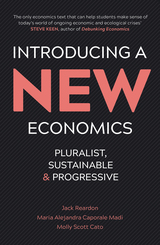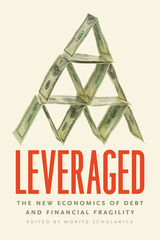3 books about New Economics

Introducing a New Economics
Pluralist, Sustainable and Progressive
Jack Reardon, Maria Alejandra Caporale Madi and Molly Scott Cato
Pluto Press, 2015
Students and lecturers worldwide increasingly reject the narrow curricula and lack of intellectual diversity that characterize mainstream economics. They demand that the real world should be brought back into the classroom in order to most effectively confront current crises. Introducing a New Economics is a groundbreaking textbook that heralds this revolution in the teaching of economics. With a firm commitment to theoretical, methodological, and disciplinary pluralism, the authors challenge the institutional education hegemony head on. This unique textbook reflects a new ethos of economics teaching that highlights sustainability and justice through its discussion of work, employment, power, capital, markets, money, and debt. A progressive work, it will set the standard for the growing heterodox economics movement for years to come.
[more]

Leveraged
The New Economics of Debt and Financial Fragility
Edited by Moritz Schularick
University of Chicago Press, 2022
An authoritative guide to the new economics of our crisis-filled century. Published in collaboration with the Institute for New Economic Thinking.
The 2008 financial crisis was a seismic event that laid bare how financial institutions’ instabilities can have devastating effects on societies and economies. COVID-19 brought similar financial devastation at the beginning of 2020 and once more massive interventions by central banks were needed to heed off the collapse of the financial system. All of which begs the question: why is our financial system so fragile and vulnerable that it needs government support so often?
For a generation of economists who have risen to prominence since 2008, these events have defined not only how they view financial instability, but financial markets more broadly. Leveraged brings together these voices to take stock of what we have learned about the costs and causes of financial fragility and to offer a new canonical framework for understanding it. Their message: the origins of financial instability in modern economies run deeper than the technical debates around banking regulation, countercyclical capital buffers, or living wills for financial institutions. Leveraged offers a fundamentally new picture of how financial institutions and societies coexist, for better or worse.
The essays here mark a new starting point for research in financial economics. As we muddle through the effects of a second financial crisis in this young century, Leveraged provides a road map and a research agenda for the future.
The 2008 financial crisis was a seismic event that laid bare how financial institutions’ instabilities can have devastating effects on societies and economies. COVID-19 brought similar financial devastation at the beginning of 2020 and once more massive interventions by central banks were needed to heed off the collapse of the financial system. All of which begs the question: why is our financial system so fragile and vulnerable that it needs government support so often?
For a generation of economists who have risen to prominence since 2008, these events have defined not only how they view financial instability, but financial markets more broadly. Leveraged brings together these voices to take stock of what we have learned about the costs and causes of financial fragility and to offer a new canonical framework for understanding it. Their message: the origins of financial instability in modern economies run deeper than the technical debates around banking regulation, countercyclical capital buffers, or living wills for financial institutions. Leveraged offers a fundamentally new picture of how financial institutions and societies coexist, for better or worse.
The essays here mark a new starting point for research in financial economics. As we muddle through the effects of a second financial crisis in this young century, Leveraged provides a road map and a research agenda for the future.
[more]

New Economics and Its History, Volume 29
John B. Davis, ed.
Duke University Press
The history of economic thought has traditionally focused on the work of individuals no longer living. Recently, however, historians have begun to use their tools of analysis on the work of contemporary economists. New Economics and Its Writing compiles evidence of this shift, with thirteen essays by scholars interested in catalyzing conversation between contemporary economists and historians of economics.
This new focus requires new methods of analysis—historiographic strategies involving far greater archival resources, for instance, and often nontraditional resources, such as electronic records. Essays collected here address these changes and examine how this new emphasis on the work of living economists can and will entail interaction between the producer of theory and the historian, complicating the latter’s role. Chapters discuss topics such as the emergence of subdisciplines in economics, social-contextual perspectives on the writing of economics, the dynamics of idea development, and the recent incursion of noneconomic thinking—such as engineering methods and mathematical models—into economics.
New Economics and Its Writing shows that attention to recent, ongoing economics from historians of economics has the potential to revitalize and transform the history of economics as an area of investigation.
This new focus requires new methods of analysis—historiographic strategies involving far greater archival resources, for instance, and often nontraditional resources, such as electronic records. Essays collected here address these changes and examine how this new emphasis on the work of living economists can and will entail interaction between the producer of theory and the historian, complicating the latter’s role. Chapters discuss topics such as the emergence of subdisciplines in economics, social-contextual perspectives on the writing of economics, the dynamics of idea development, and the recent incursion of noneconomic thinking—such as engineering methods and mathematical models—into economics.
New Economics and Its Writing shows that attention to recent, ongoing economics from historians of economics has the potential to revitalize and transform the history of economics as an area of investigation.
This volume is the 1997 Annual Supplement to the journal History of Political Economy. All 1997 subscribers will receive a copy of this book as part of their annual subscription.
Contributors. Timothy L. Alborn, Marcel Boumans, Joshua Cohen, John B. Davis, Ross B. Emmett, Paul Harrison, Daniel M. Hausman, Mary L. Hirschfeld, S. Todd Lowry, Steven G. Medema, Philip Mirowski, Philippe Mongin, S. Abu Turab Rizvi, Esther-Mirjam Sent
[more]
READERS
Browse our collection.
PUBLISHERS
See BiblioVault's publisher services.
STUDENT SERVICES
Files for college accessibility offices.
UChicago Accessibility Resources
home | accessibility | search | about | contact us
BiblioVault ® 2001 - 2024
The University of Chicago Press









